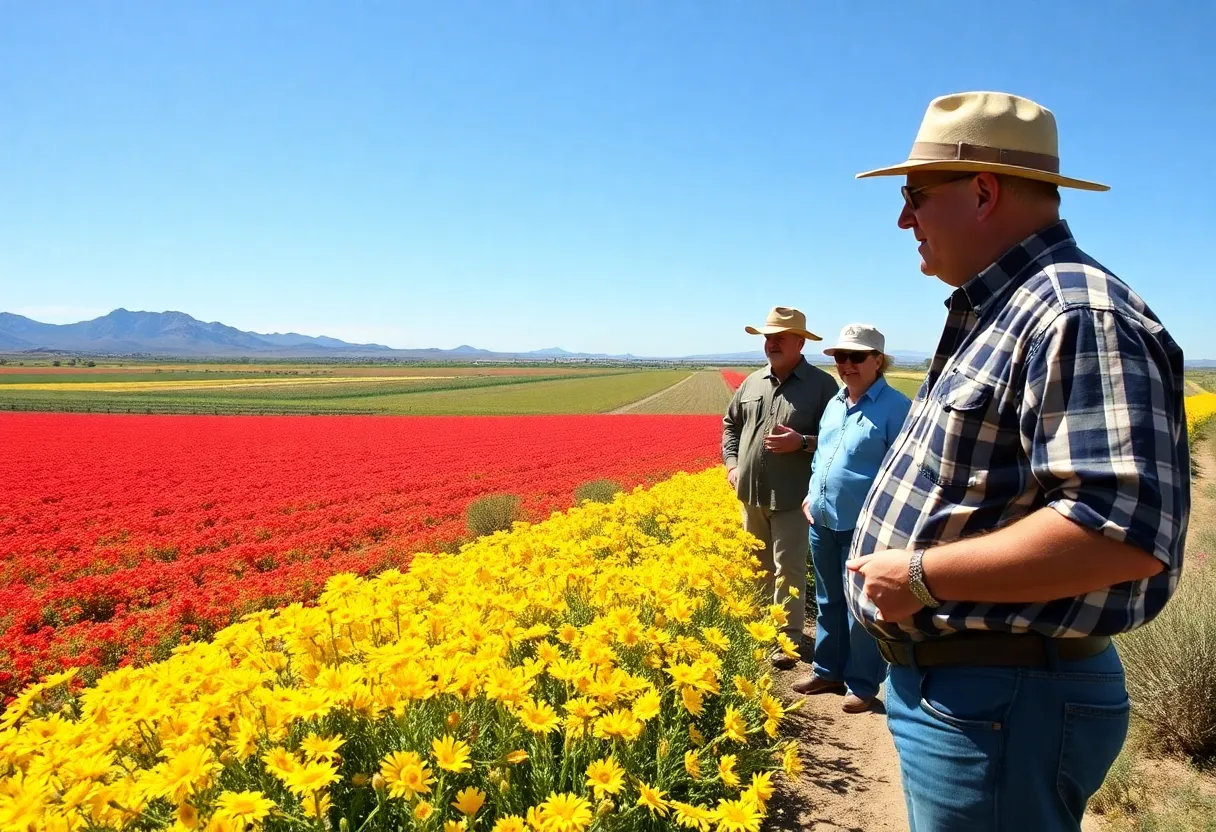News Summary
Arizona farmers in Tubac are facing financial uncertainty due to new tariffs imposed by the Biden administration, particularly a 25% tax on imports from Canada and Mexico. This could significantly increase operating costs for essential supplies such as fertilizer and machinery, disturbing the agricultural supply chain. Local farmers are concerned about the long-term consequences, including potential retaliatory tariffs and their ability to remain competitive. As they adapt to these changes, the community is hopeful for renewed trade relationships that could benefit the agricultural sector.
Arizona Farmers Brace for High Costs Amid New Tariffs on Imports and Exports
In the sunny and vibrant community of Tubac, Arizona, local farmers, ranchers, and importers are feeling a pinch as they keep a watchful eye on the recent tariffs announced by the Biden administration. With a shift in focus from traditional partners Canada and Mexico to a broader scope of nearly 60 countries, this news has sparked concerns about how these changes could affect the agricultural landscape in the region.
Understanding the Tariffs
The news of proposed tariffs, particularly the daunting 25% on products from Canada and Mexico, has left many in the agricultural sector wondering what the future holds. Farmers for Free Trade recently held a town hall meeting in Tubac, allowing locals to gather and discuss the potential fallout of these economic decisions. The situation has understandably raised eyebrows as experts weigh in on the implications of these tariffs.
Farmers are aware that tariffs are essentially taxes that could drastically increase operational costs. The fear is that essential supplies such as fertilizer, pesticides, and machinery will see skyrocketing prices, squeezing already tight margins. Given that Mexico provides an impressive 98% of Arizona’s $1.2 billion vegetable imports, any hurdles here could create serious disruptions in the supply chain.
Real Financial Concerns
Post-announcement, it became clear just how severe the financial burden could be. A tariff that was once a mere percentage point now looms as a giant hurdle, with the example of a 25% tariff on tomatoes from Mexico illustrating the potential pain point. Arizona importers could be looking at paying an eyebrow-raising $251 million in taxes instead of the usual $3,000 for their imports. This is a staggering jump that could have the farming community reeling.
As fears mount, exit strategies are already being contemplated. Some farmers are opting for pre-purchasing supplies to sidestep the impending tariff increases, aiming to safeguard their cash flow during these uncertain times. But the looming threat of price hikes is on the horizon, and consumers will likely feel this pressure too — ultimately leading to higher prices at grocery stores. It’s a ripple effect that could cut deep into the pockets of small-margin farmers already facing stiff competition.
Long-term Consequences
The conversation about tariffs doesn’t just end with financial burdens. Many in the industry express concerns about potential retaliatory tariffs from Canada and Mexico, which could throw more fuel on the fire. There’s a genuine worry that these ongoing tariff disputes may not only affect current trade relations but could also create a more extensive web of regulations and taxes within the agricultural sector.
With the COVID-19 pandemic already causing high prices in the industry, the thought of a 25% tariff on imported goods — particularly fertilizers — is causing even more worry. The situation is setting off alarms about how these increased operating costs could keep farmers from remaining competitive and being able to conduct their operations smoothly. As many farmers venture into uncertain territory, the implications of these tariffs could mean the difference between thriving and simply surviving.
Looking Ahead
Despite the mounting pressures, there’s still a sense of cautious optimism as Arizona farmers and ranchers navigate these turbulent waters. The conversation continues as they work to adapt to what comes next in this unpredictable economic landscape. As the effects of the new tariffs unfold, only time will tell just how deeply they will impact Arizona’s rich agricultural community. Farmers are banding together, sharing ideas, and seeking ways to not just cope but thrive amidst change. Let’s hope for positive outcomes and renewed trade relationships that benefit all involved in this vital industry.
Deeper Dive: News & Info About This Topic
- Azcentral: Arizona Farmers Fear Long-Term Effects of Tariffs
- ABC15: Arizona Dairy Industry Grapples with Tariffs
- Az Big Media: Tariffs War Threatens Higher Costs for Farmers
- Google Search: Arizona tariffs impact on farmers
- Tucson Sentinel: Arizona Tariffs Report
- Wikipedia: Tariffs

Author: STAFF HERE PHOENIX WRITER
The PHOENIX STAFF WRITER represents the experienced team at HEREPhoenix.com, your go-to source for actionable local news and information in Phoenix, Maricopa County, and beyond. Specializing in "news you can use," we cover essential topics like product reviews for personal and business needs, local business directories, politics, real estate trends, neighborhood insights, and state news affecting the area—with deep expertise drawn from years of dedicated reporting and strong community input, including local press releases and business updates. We deliver top reporting on high-value events such as the Waste Management Phoenix Open, Cactus League Spring Training, and Arizona State Fair. Our coverage extends to key organizations like the Greater Phoenix Chamber of Commerce and Visit Phoenix, plus leading businesses in technology and healthcare that power the local economy such as Intel and Banner Health. As part of the broader HERE network, including HERETucson.com, we provide comprehensive, credible insights into Arizona's dynamic landscape.





